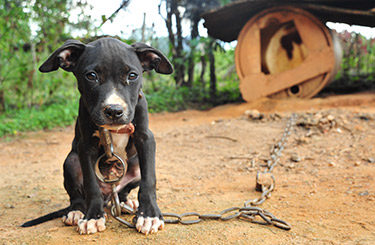The 2007 indictment of then-Atlanta Falcons quarterback Michael Vick led to historic changes in the animal welfare field and the nation’s perception of dogfighting. Prior to the investigation, dogfighting cases involving federal authorities were extremely rare. The Vick case, which involved two arms of the federal government, the United States Department of Agriculture (USDA) and the Department of Justice, put the blood sport on the map as a federal offense.
Dogfighting is now banned throughout the United States and is a felony in all 50 states. At the time, those convicted of federal animal fighting charges faced up to three years in prison for each guilty count. The Vick case elevated the issue of dogfighting to a new level of national attention, the waves of which continue to be felt a decade later: In 2016, the federal sentencing guidelines for animal fighting were raised to 21-27 months. Furthermore, the revised guidelines explicitly state that causing harm to a large number of animals and performing acts of extraordinary cruelty to animals are grounds for imposing longer sentences.
ASPCA's Involvement in the Case
The Michael Vick investigation began in April 2007 with a search of Bad Newz Kennels, located on Vick’s Surry County, Virginia, property. The ASPCA assisted in the recovery and analysis of forensic evidence from Vick’s property, including carcasses and skeletal remains of numerous pit bulls. The evidence helped to convict the football star of operating a competitive dogfighting ring, a federal offense that resulted in a prison term for Vick and three co-defendants.
The ASPCA also led a team of certified applied animal behaviorists in behavior evaluations of the rescued dogs, making recommendations to the USDA and U.S. attorney’s office regarding the dispositions of the dogs. The team was led by the ASPCA’s Dr. Stephen Zawistowski, Dr. Randall Lockwood and Dr. Pamela Reid.
The Dogs
Of the 49 pit bulls evaluated by the ASPCA-led team, only one was deemed behaviorally unfit for rehabilitation and recommended for euthanasia. A federal judge determined the final disposition of the 48 remaining dogs, who were then placed with sanctuaries and rescues groups, including California pit bull rescue Bay Area Dog Lovers Responsible About Pit Bulls (BAD RAP) and Best Friends Animal Society who took in many of the Vick dogs. Some of these dogs were subsequently made available for adoption by the public.
Timeline of the Vick Investigation
April 25, 2007: Authorities execute a search warrant on Vick's property, seizing more than 60 dogs and assorted dogfighting-related paraphernalia.
July 17, 2007: Vick and three co-defendants are indicted by a federal grand jury on dogfighting charges.
August 27, 2007: Vick pleads guilty to a federal charge in connection with a dogfighting operation on his Virginia property. As part of Vick's plea agreement, he places almost $1 million restitution into a fund used to care for and rehabilitate the animals.
November 19, 2007: Vick surrenders to U.S. Marshals three weeks before his December 10 sentencing date in order to begin serving his prison sentence early.
November 30, 2007: Two of Vick’s co-defendants, Purnell Peace and Quanis Phillips—who pleaded guilty to several charges, including conspiring to travel in interstate commerce in aid of unlawful activities and to sponsoring a dog in an animal fighting venture—receive sentences of 18 and 21 months, respectively, which fall on the higher end of the federal sentencing guidelines [at the time]. Both are put on probation for an additional three years, during which time they are prohibited from having any contact with dogs.
December 10, 2007: Vick is sentenced in Richmond, Virginia, to 23 months in federal prison, followed by a three-year probation period that forbade him to own or have any contact with dogs other than supporting humane organizations.
April 10, 2008: At the U.S. Attorney's Office Law Enforcement Public Service Awards ceremony, presided over by Chuck Rosenberg, U.S. Attorney, Eastern District of Virginia, four ASPCA team members are recognized for their invaluable assistance in the Vick investigation.

